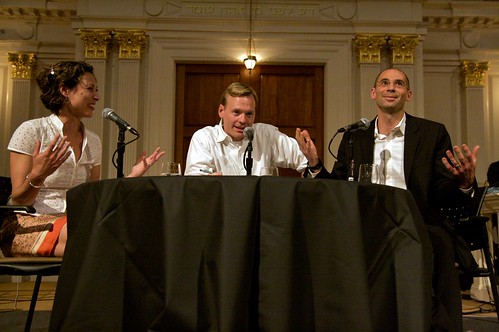With its mildly lefty contrarian tone and frequent crossovers with NPR – and, I should say, solid but accessible policy analysis and spot-on cultural reviews – Slate has long been a staple in my online reading. It’s also been a staple in my podcast lineup, ever since I got my first iPod and suddenly needed something to put on it for long spinning sessions. Since several of the Slate podcasts are calling for listeners to recruit more listeners this week, I thought I’d note my favorites, and where to get them.
The Political Gabfest is the original Slate podcast, and the template for newer models. Emily Bazelon, John Dickerson, and David Plotz talk about (usually) three topics in the week’s (usually) political news. Plotz is a liberaltarian grump, Bazelon more idealistic, Dickerson focused on the political mechanics behind the issue of the moment; all three bounce off each other in endearing and enlightening ways. Dickerson mediates (or tables) at least one Plotz-Bazelon argument per episode. (Subscribe in iTunes.)
 Political Gabfesters Emily Bazelon, John Dickerson, and David Plotz at a live Gabfest event last May. Photo by presta.
Political Gabfesters Emily Bazelon, John Dickerson, and David Plotz at a live Gabfest event last May. Photo by presta.The Culture Gabfest applies the Gabfest model to cultural news. Stephen Metcalf moderates in Plotz-y tones, and is usually joined by Julia Turner and Dana Stevens – but the Culture Gabfest often includes fourth or fifth panelists to discuss particular topics. My tastes track Metcalf’s pretty closely, but Stevens’s reviews were informing my movie-going decisions long before the podcast launched. (Subscribe in iTunes.)
Dana Stevens also helms Spoiler Specials, in which she and another film critic or two dissect a current movie, with no regard to hiding plot points. It’s great fun after you’ve seen a movie, or, if you’re into schadenfreude, often just as much fun with reference to a movie you have no intention of seeing (Transformers, for example). (Subscribe in iTunes.)
Hang up and Listen is back to the Gabfest model, but about sports – the conversation between sports journalists Stefan Fatsis, Josh Levin, and Mike Pesca is like sports talk radio, but you don’t call in, hence the name. In fact, it’s not really like sports talk radio, inasmuch as I, a nerd whose sports are unwatchable individual endurance events (running, cycling), find it totally interesting. Part of this may be because both Fatsis and Levin Pesca* are regular NPR contributors, who are used to talking sports with an audience that doesn’t follow them. (Subscribe in iTunes.)
Conveniently, you can subscribe to each of these individually at the links I’ve given above (they’re all on a weekly-ish cycle, with Spoiler Specials somewhat less frequent), or get them as part of Slate’s daily podcast stream. If you go with the daily stream, you’ll get a few less-frequent ‘casts I’ve left out, that are nevertheless good when they show up.
*Corrected 15:18, 18 Feb 2010
 Dan Savage. Photo by soundfromwayout.
Dan Savage. Photo by soundfromwayout.


